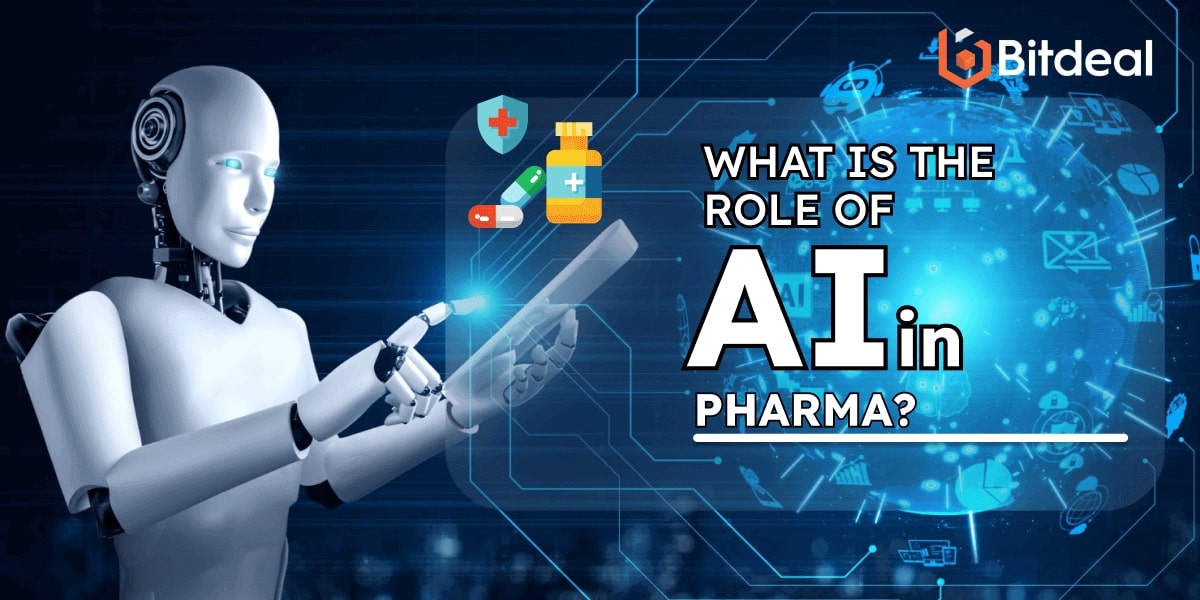The pharmaceutical sector has long stood as a bastion of innovation, ceaselessly striving to create life-saving drugs and groundbreaking treatments. Today, a formidable catalyst is propelling this evolution: Artificial Intelligence (AI).
AI, with its profound capacity to decipher extensive datasets, uncover intricate patterns, and automate intricate tasks, is reshaping every facet of the pharmaceutical realm, from drug discovery to personalized medicine.
AI's Impact on Pharma Industry
Envision a world where AI algorithms formulate the next breakthrough medication, forecast individual patient responses to therapies, and optimize manufacturing procedures for expedited delivery. This vision is not confined to science fiction; it is the imminent reality promised by AI's integration into the pharmaceutical sphere.
AI's Role in Drug Discovery and Development
- The traditional drug discovery path, known for its protracted duration and exorbitant costs, is undergoing a seismic shift thanks to AI's influence:
- Analyzing vast pools of genomic, chemical, and clinical data to pinpoint promising drug targets and forecast their potential efficacy and safety.
- Constructing virtual simulations of cells and organs, enabling researchers to virtually test drug candidates before initiating expensive lab experiments.
- Automating mundane tasks like data analysis and compound screening, freeing up scientists to focus on innovative problem-solving.
- Consequently, AI is accelerating the drug discovery and development process, potentially delivering novel treatments to patients at an accelerated pace and reduced costs.
Challenges Confronting the Pharma Sector
- Despite AI's remarkable potential, the pharmaceutical industry faces several hurdles in embracing this technology:
- Substantial initial investment: Establishing robust AI infrastructure necessitates significant financial resources and technical prowess.
- Data quality and integration: The existing data in pharmaceutical companies often resides in fragmented silos, impeding effective analysis by AI algorithms.
- Regulatory concerns: Ethical and safety implications of AI-driven drug development are yet to be fully addressed by regulatory bodies.
AI Applications Revolutionizing Drug Discovery
- Let's delve into specific AI applications driving innovation in drug discovery:
- Machine learning algorithms: Scrutinizing extensive datasets to identify potential drug targets and forecast their effectiveness.
- Natural Language Processing (NLP): Extracting insights from medical literature and clinical trial data to expedite research.
- Generative models: Designing new drug candidates with specific attributes, exploring a vast chemical space virtually.
- Robotic automation: Automating repetitive tasks in high-throughput screening and other laboratory processes.
Personalized Medicine and Treatment
- Among AI's most promising applications in pharma is personalized medicine. AI algorithms can scrutinize individual patient data, encompassing genomics, medical history, and lifestyle factors, to predict their response to specific treatments and customize therapy accordingly. This can lead to:
- Enhanced treatment efficacy: Tailoring drugs to individual patient profiles heightens effectiveness while reducing side effects, boosting treatment success rates.
- Reduced healthcare costs: Avoiding ineffective treatments and unnecessary hospitalizations through personalized medicine can yield substantial cost savings for patients and healthcare systems.
Repurposing and Optimization of Drugs
AI breathes new life into existing drugs by discovering new therapeutic uses and optimizing their formulation and delivery. By analyzing extensive datasets of clinical trial data and patient records, AI can unearth new applications for existing drugs, potentially expediting development and reducing costs.
Data Integration and Analysis
- Establishing a robust data foundation is critical for powering AI's advancements in pharma. Without quality data, even the most sophisticated AI algorithms may struggle. Here's how pharmaceutical companies are harnessing their data:
- Data lake creation: Consolidating diverse data sources into a unified repository, breaking down data silos, and enabling seamless integration for AI analysis.
- Data cleaning and standardization: Ensuring data quality and uniformity by addressing missing values, rectifying errors, and formatting data into a unified structure for streamlined AI processing.
- Advanced analytics techniques: Utilizing tools like machine learning, deep learning, and natural language processing to unveil hidden patterns, predict trends, and derive actionable insights from accumulated data.
Conclusion: Pioneering Healthcare Transformation with AI
The integration of AI into the pharmaceutical domain isn't merely a technological shift; it marks a revolutionary transformation poised to redefine healthcare. By expediting drug discovery, tailoring treatments, and optimizing processes, AI promises to:
- Accelerate the delivery of life-saving drugs to patients at reduced costs.
- Enhance treatment efficacy while minimizing the risk of side effects.
- Empower healthcare professionals with personalized medical data and AI-driven insights.
- Forge a healthier future for individuals and global healthcare systems.
- Embracing AI ethically and responsibly is paramount. Through collaborative efforts between scientists, engineers, and regulatory bodies, AI can serve as a driving force for positive change, unlocking an era of healthcare innovation and fostering a healthier future for generations.
Looking to venture into this transformative field? Connect with Bitdeal, a pioneering AI Development Company.
Talk to our experts
Call Us - +91 9677555651
Drop An Email - [email protected]
WhatsApp Us - +91 9500766642
Telegram Us - t.me/salesbitdeal




.jpg)

Comments